-
 Bitcoin
Bitcoin $106,782.3966
-0.72% -
 Ethereum
Ethereum $2,406.7764
-1.16% -
 Tether USDt
Tether USDt $1.0005
0.02% -
 XRP
XRP $2.0918
-1.53% -
 BNB
BNB $644.5785
-0.17% -
 Solana
Solana $141.0925
-0.69% -
 USDC
USDC $1.0000
0.02% -
 TRON
TRON $0.2721
0.18% -
 Dogecoin
Dogecoin $0.1585
-1.26% -
 Cardano
Cardano $0.5497
-1.14% -
 Hyperliquid
Hyperliquid $35.8493
-1.58% -
 Bitcoin Cash
Bitcoin Cash $502.3089
2.20% -
 Sui
Sui $2.7092
3.87% -
 Chainlink
Chainlink $12.8551
-1.85% -
 UNUS SED LEO
UNUS SED LEO $9.0548
0.53% -
 Stellar
Stellar $0.2344
-0.85% -
 Avalanche
Avalanche $17.2676
-0.23% -
 Toncoin
Toncoin $2.8282
0.56% -
 Shiba Inu
Shiba Inu $0.0...01113
-1.14% -
 Litecoin
Litecoin $83.9593
-0.93% -
 Hedera
Hedera $0.1447
0.82% -
 Monero
Monero $306.9022
-2.07% -
 Bitget Token
Bitget Token $4.6358
3.42% -
 Dai
Dai $0.9999
0.01% -
 Ethena USDe
Ethena USDe $1.0001
0.02% -
 Polkadot
Polkadot $3.3211
0.06% -
 Uniswap
Uniswap $6.8775
0.75% -
 Pi
Pi $0.5664
-0.27% -
 Aave
Aave $256.0055
1.28% -
 Pepe
Pepe $0.0...09013
-3.24%
What to do if the ETH wallet address is lost? Recovery methods and prevention suggestions
If you lose your ETH wallet address, use your seed phrase or private key to recover it on a compatible wallet like MetaMask or MyEtherWallet.
May 13, 2025 at 12:42 am
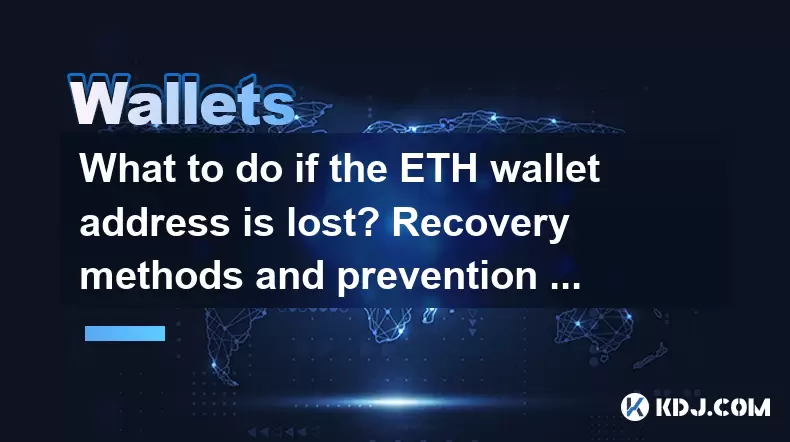
Losing an Ethereum (ETH) wallet address can be a distressing experience, especially if it contains significant funds. However, there are several recovery methods and preventive measures you can take to mitigate the risk and potentially recover your lost wallet. This article will guide you through the steps to recover a lost ETH wallet address and provide suggestions on how to prevent such incidents in the future.
Understanding ETH Wallet Addresses
Before diving into recovery methods, it's important to understand what an ETH wallet address is. An ETH wallet address is a unique string of characters that serves as a public identifier for your Ethereum account. It's used to receive ETH and other tokens on the Ethereum blockchain. Losing this address can mean losing access to your funds if you don't have the private key or seed phrase associated with it.
Recovery Methods for Lost ETH Wallet Addresses
Using the Seed Phrase
If you have the seed phrase (also known as the mnemonic phrase) associated with your lost ETH wallet, you can easily recover your wallet address. The seed phrase is a list of words that can be used to restore your wallet on any compatible platform. Here's how to recover your wallet using the seed phrase:
- Choose a compatible wallet: Select a wallet that supports seed phrase recovery, such as MetaMask, MyEtherWallet, or Ledger Live.
- Enter the seed phrase: When setting up the wallet, you'll be prompted to enter your seed phrase. Input the words in the correct order.
- Access your wallet: Once the seed phrase is verified, the wallet will generate your ETH address, and you'll regain access to your funds.
Using the Private Key
If you have the private key associated with your lost ETH wallet, you can also recover your wallet address. The private key is a long string of characters that gives you full control over your ETH funds. Here's how to recover your wallet using the private key:
- Choose a compatible wallet: Select a wallet that supports private key import, such as MetaMask, MyEtherWallet, or Trust Wallet.
- Import the private key: When setting up the wallet, look for an option to import a private key. Enter your private key carefully.
- Access your wallet: Once the private key is verified, the wallet will generate your ETH address, and you'll regain access to your funds.
Using Transaction History
If you don't have the seed phrase or private key, you might still be able to recover your ETH wallet address by examining your transaction history. This method is more complex and less reliable, but it can be a last resort. Here's how to attempt recovery using transaction history:
- Access a blockchain explorer: Use a blockchain explorer like Etherscan to search for transactions you've made from your lost wallet.
- Identify the sender address: Look for transactions where you were the sender. The sender address in these transactions is your lost ETH wallet address.
- Verify the address: Once you've identified the address, you can use it to access your wallet if you can find a way to import it into a wallet application.
Preventive Measures to Avoid Losing Your ETH Wallet Address
Securely Store Your Seed Phrase and Private Key
The most effective way to prevent losing your ETH wallet address is to securely store your seed phrase and private key. Here are some tips for secure storage:
- Write it down: Write your seed phrase and private key on a piece of paper and store it in a safe place, such as a locked drawer or a safe deposit box.
- Use a hardware wallet: Consider using a hardware wallet like Ledger or Trezor, which stores your private key offline and provides an additional layer of security.
- Encrypt digital copies: If you must store digital copies, encrypt them and store them on a secure device, such as an encrypted USB drive.
Regularly Back Up Your Wallet
Regularly backing up your wallet can help you recover your ETH wallet address if it's lost. Here's how to back up your wallet:
- Export your wallet: Use your wallet application to export your wallet data, which may include your seed phrase, private key, or a keystore file.
- Store the backup securely: Store the backup in a secure location, following the same principles as storing your seed phrase and private key.
Use Multiple Wallets
Using multiple wallets can provide an additional layer of security and help you recover your ETH wallet address if one is lost. Here's how to use multiple wallets effectively:
- Distribute your funds: Spread your ETH across multiple wallets to minimize the risk of losing all your funds if one wallet is compromised.
- Keep track of your wallets: Maintain a secure record of all your wallet addresses, seed phrases, and private keys.
Enable Two-Factor Authentication (2FA)
Enabling two-factor authentication (2FA) on your wallet can add an extra layer of security and help prevent unauthorized access. Here's how to enable 2FA:
- Choose a 2FA method: Select a 2FA method, such as an authenticator app or a physical security key.
- Set up 2FA: Follow the instructions in your wallet application to set up 2FA. This usually involves scanning a QR code or entering a setup key into your 2FA app.
- Verify 2FA: Once set up, you'll need to enter a 2FA code each time you access your wallet, adding an extra layer of security.
Frequently Asked Questions
Q: Can I recover my ETH wallet address if I only have the public address?
A: No, the public address alone is not enough to recover your ETH wallet. You need the seed phrase or private key to access your funds.
Q: Is it safe to store my seed phrase or private key digitally?
A: Storing your seed phrase or private key digitally is risky, but if you must do so, ensure it's encrypted and stored on a secure device. Physical storage is generally safer.
Q: What should I do if I suspect my ETH wallet has been compromised?
A: If you suspect your wallet has been compromised, immediately transfer your funds to a new, secure wallet. Change any associated passwords and enable 2FA if you haven't already.
Q: Can I use a password manager to store my seed phrase and private key?
A: While password managers can be secure, it's generally recommended to avoid storing your seed phrase and private key in them. Physical storage or hardware wallets are safer options.
Disclaimer:info@kdj.com
The information provided is not trading advice. kdj.com does not assume any responsibility for any investments made based on the information provided in this article. Cryptocurrencies are highly volatile and it is highly recommended that you invest with caution after thorough research!
If you believe that the content used on this website infringes your copyright, please contact us immediately (info@kdj.com) and we will delete it promptly.
- Smart Investors Navigate the AI Token Frenzy: Bitcoin Switch and Beyond
- 2025-06-28 12:30:12
- Crypto in 2025: How Web3 AI is Poised to Dominate
- 2025-06-28 12:30:12
- Solana's Support Level Holds as MACD Crossover Hints at Potential Bullish Reversal
- 2025-06-28 12:50:12
- Cathie Wood's Ark Invest: Navigating Coinbase (COIN) and SoFi (SOFI) in a Shifting Market
- 2025-06-28 12:53:43
- Crypto 2025: Spotting the Top Coins with Real Utility
- 2025-06-28 12:42:12
- Pepe Price's Wild Ride: Cryptocurrency Milestone or Just Another Meme?
- 2025-06-28 12:42:13
Related knowledge

How to stake cryptocurrencies on Coinbase? Benefits and risks
Jun 27,2025 at 06:36pm
Understanding Cryptocurrency Staking on CoinbaseStaking cryptocurrencies involves locking up digital assets to support the operations of a blockchain network, typically in return for rewards. Coinbase, one of the most popular cryptocurrency exchanges globally, offers staking services for several proof-of-stake (PoS) coins. Users can stake their holdings...
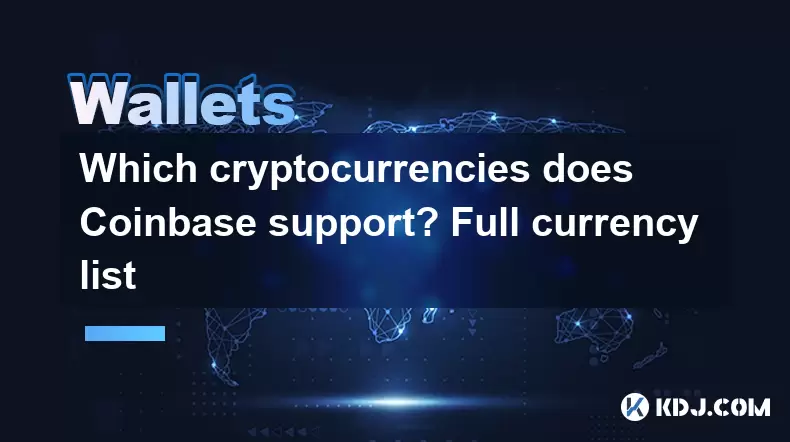
Which cryptocurrencies does Coinbase support? Full currency list
Jun 28,2025 at 08:36am
Overview of Cryptocurrencies Supported by CoinbaseCoinbase is one of the most popular and trusted cryptocurrency exchanges globally. It provides users with a platform to buy, sell, trade, and store various digital assets. As of the latest updates, Coinbase supports over 200 cryptocurrencies, including major ones like Bitcoin (BTC), Ethereum (ETH), and L...
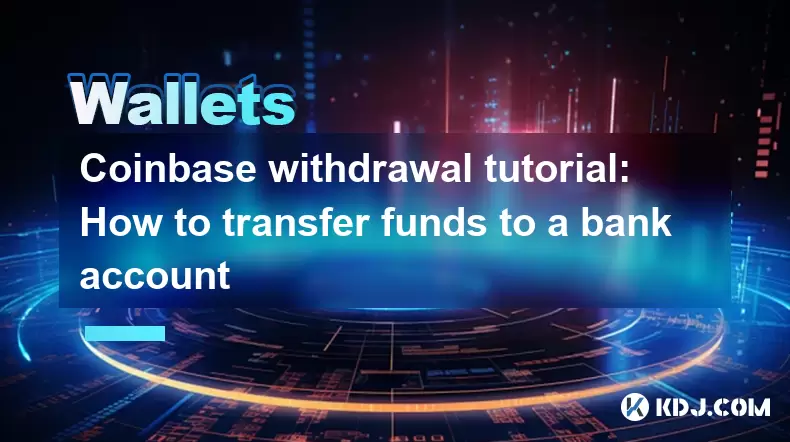
Coinbase withdrawal tutorial: How to transfer funds to a bank account
Jun 28,2025 at 02:35am
Understanding Coinbase WithdrawalsCoinbase is one of the most widely used cryptocurrency platforms, allowing users to buy, sell, and store digital assets. Once you've successfully traded or held your crypto on Coinbase, the next logical step may be to withdraw funds to a bank account. This process involves converting your cryptocurrency into fiat curren...
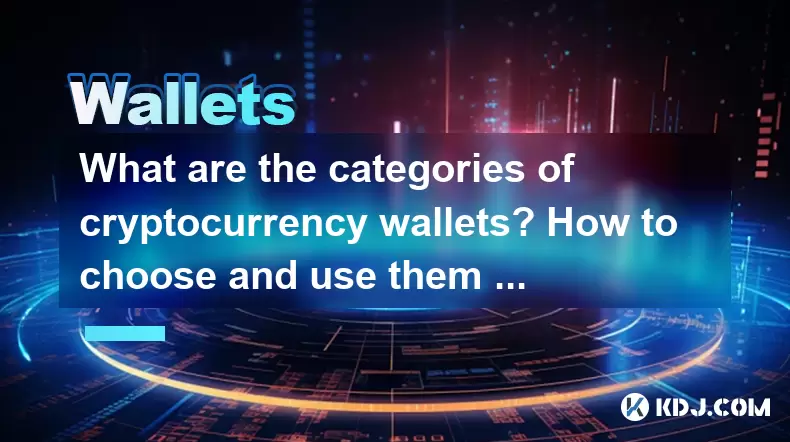
What are the categories of cryptocurrency wallets? How to choose and use them safely?
Jun 21,2025 at 10:42pm
Understanding Cryptocurrency WalletsCryptocurrency wallets are essential tools for anyone involved in the digital asset ecosystem. They allow users to store, send, and receive cryptocurrencies securely. Unlike traditional wallets that hold physical money, crypto wallets manage cryptographic keys—private and public—which interact with blockchain networks...
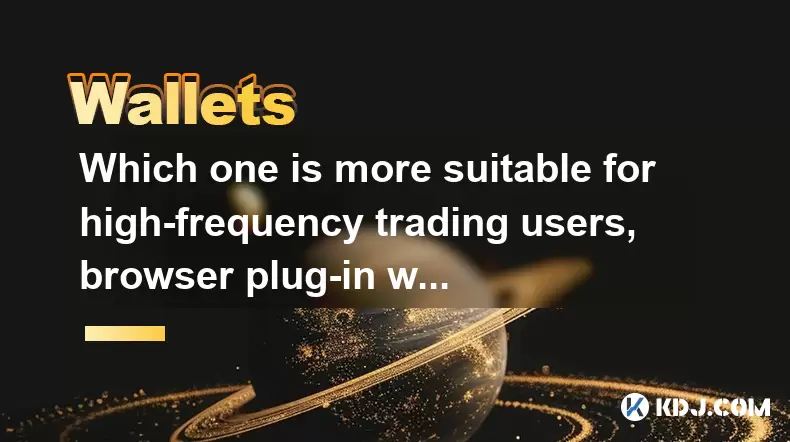
Which one is more suitable for high-frequency trading users, browser plug-in wallets or independent application wallets?
Jun 23,2025 at 08:22am
Understanding the Role of Wallets in High-Frequency TradingFor high-frequency trading (HFT) users in the cryptocurrency market, wallet selection is critical due to the need for speed, security, and seamless integration with trading platforms. HFT involves executing a large number of trades within seconds or even milliseconds, which demands a wallet that...

What are the differences between the operating mechanisms of on-chain wallets and off-chain wallets? Is there a big difference in transaction fees?
Jun 25,2025 at 08:49am
Understanding On-Chain WalletsOn-chain wallets are digital wallets that directly interact with the blockchain network. These wallets store users' private keys, which are essential for signing and authorizing transactions on the blockchain. When using an on-chain wallet, every transaction must be recorded and verified by the decentralized nodes in the ne...

How to stake cryptocurrencies on Coinbase? Benefits and risks
Jun 27,2025 at 06:36pm
Understanding Cryptocurrency Staking on CoinbaseStaking cryptocurrencies involves locking up digital assets to support the operations of a blockchain network, typically in return for rewards. Coinbase, one of the most popular cryptocurrency exchanges globally, offers staking services for several proof-of-stake (PoS) coins. Users can stake their holdings...

Which cryptocurrencies does Coinbase support? Full currency list
Jun 28,2025 at 08:36am
Overview of Cryptocurrencies Supported by CoinbaseCoinbase is one of the most popular and trusted cryptocurrency exchanges globally. It provides users with a platform to buy, sell, trade, and store various digital assets. As of the latest updates, Coinbase supports over 200 cryptocurrencies, including major ones like Bitcoin (BTC), Ethereum (ETH), and L...

Coinbase withdrawal tutorial: How to transfer funds to a bank account
Jun 28,2025 at 02:35am
Understanding Coinbase WithdrawalsCoinbase is one of the most widely used cryptocurrency platforms, allowing users to buy, sell, and store digital assets. Once you've successfully traded or held your crypto on Coinbase, the next logical step may be to withdraw funds to a bank account. This process involves converting your cryptocurrency into fiat curren...

What are the categories of cryptocurrency wallets? How to choose and use them safely?
Jun 21,2025 at 10:42pm
Understanding Cryptocurrency WalletsCryptocurrency wallets are essential tools for anyone involved in the digital asset ecosystem. They allow users to store, send, and receive cryptocurrencies securely. Unlike traditional wallets that hold physical money, crypto wallets manage cryptographic keys—private and public—which interact with blockchain networks...

Which one is more suitable for high-frequency trading users, browser plug-in wallets or independent application wallets?
Jun 23,2025 at 08:22am
Understanding the Role of Wallets in High-Frequency TradingFor high-frequency trading (HFT) users in the cryptocurrency market, wallet selection is critical due to the need for speed, security, and seamless integration with trading platforms. HFT involves executing a large number of trades within seconds or even milliseconds, which demands a wallet that...

What are the differences between the operating mechanisms of on-chain wallets and off-chain wallets? Is there a big difference in transaction fees?
Jun 25,2025 at 08:49am
Understanding On-Chain WalletsOn-chain wallets are digital wallets that directly interact with the blockchain network. These wallets store users' private keys, which are essential for signing and authorizing transactions on the blockchain. When using an on-chain wallet, every transaction must be recorded and verified by the decentralized nodes in the ne...
See all articles























































































